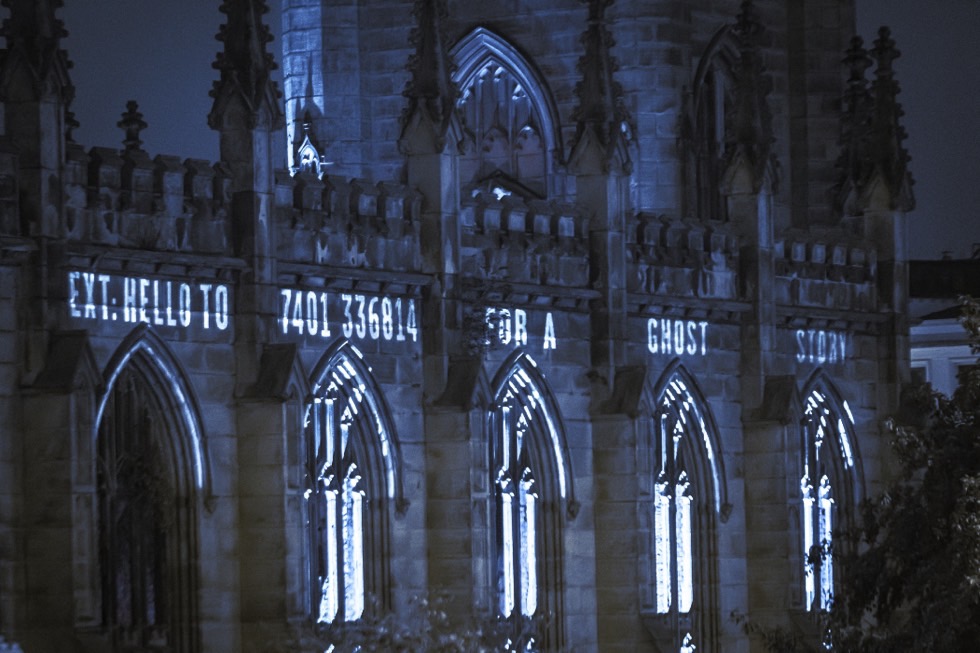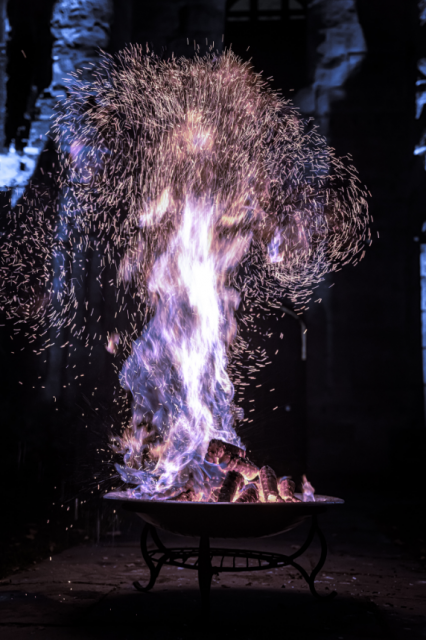The Ghost Caller – Reviewed

Given the opportunity, would you dare speak to a ghost? This was the hook for theatre company Headlong’s The Ghost Caller. With some trepidation, Thomas Florence answered the call…
Late last year, a phone number was projected onto the exterior walls of St Luke’s Bombed Out Church in Liverpool.
Text it and you would’ve reached Headlong’s The Ghost Caller, a short play written by Luke Barnes and performed by acting royalty David Morrisey and Leanne Best. Originally intended to be staged at St Luke’s before Tier 3 lockdown hit, Headlong reshaped its world premiere into far more intimate territory: a phone call. Audiences were asked to text ‘HELLO’ to a hotline and were texted back by The Ghost Caller himself, thereby stepping from the realm of traditional play and into immersive theatre.
Described as an exploration of grief and loss in 2020, a call seemed to be the perfect medium. The ‘Ghost’ of the title suggested something spectral, lost, reaching across the ether. To what end? Now, to any seasoned horror fan, one thing is plain: monsters are never just monsters. Be it regret (A Christmas Carol), a personified anxiety (Turning of The Screw), or the past returning or repeating itself (The Devil’s Backbone and – much earlier – The Stone Tape), a ghost always has a story for the living. That story might change everything.
What did this ghost have to tell me?
Picking up the phone, the experience began with a warning of what to expect; calls may trigger feelings of grief, and there was advice on what to do if you were affected. Given such warnings, my mind was primed for one of two directions: is it a Palahniuk Guts or a Telgemeier Guts?
Chuck Palahniuk’s short story Guts was apparently so shocking to his fans (who already knew of his graphic work) that some vomited during a live reading by the author. It’s visceral, it’s body horror and it’s everything an exploration should be.
On the other hand, Raina Telgemeier is a writer and artist who creates child-focused, autobiographical comics. Her Guts is a deep, introspective view of anxiety. She once said: “I learned when I was writing, the sadder and more introspective I got, the more people could find something to relate to, and the more universal it seemed.”
So, which Guts was The Ghost Caller?
Texting a number with an unknown outcome is always a sure-fire way to make you feel like a movie character, ensuring a great start. The anticipation and, dare I say, fear of receiving messages and being given instructions only extends this sense of excitement or foreboding.
I was told to flip a coin and tell them the outcome.
Heads.
This was when the phone rang.
Had I instigated something ethereal at my own peril? What I was excited for, what I wanted, was a ghost to tell me their grief, in whatever detail they wished; the format made me want to know that my participation was a reason enough that this experience occurred. The ghosts speak to Scrooge because he is the one most in need to hear them. So what was I most in need of hearing?
For me to take agency and call a number.

The title ‘Ghost Caller’ made me feel like I was going to have a conversation. What was presented instead was a classic monologue.
“This is not a ghost story”, the voice said.
It felt like an attempt to make us think of a personal ghost of our own, but this is when the issues arose. It tried to cover all pain and grief, and all responses to pain and grief, and all the ways we can or can’t move on. To bring it back to Raina’s quote, I felt that by trying to be ‘universal’ – speaking to all my ghosts and all my pain – The Ghost Caller ended up being none of them.
This impacted character development too. Who was this ghost? The lines were delivered well and with an attempt to end on a self-help note of ‘Live Properly’. It felt very much in that vein: a take on mindfulness generally, rather than a character who has been mutually vulnerable with me, who yearns for me to live life to its fullest.
My best mate telling me to live my life to its fullest pulls more heartstrings than Guru Free30daytrial.
As for interaction, the coin was a wonderful touch (it allowed you to randomly select whose voice you heard, Morrisey’s or Best’s), and provided a welcome sense of tactility that built a link between the artificial and the real, almost like the luck element of a séance.
Balancing this, and injecting some of Palahniuk’s Guts, at the start of his story you must hold your breath. A small ask, which, when you gag for air, makes what is happening in the narrative all the more personal.
I waited and listened, and I was asked to close my eyes. But I wanted The Ghost Caller to ask me to do more, as in an actual call, with my responses having consequences. Be it a larger ask, whereby my responses had a knock-on effect on narrative, to something as small as the ending being slightly different if I chose the Tails rather than Heads route (does a different ghost have a different perspective? They would, surely). I understand ‘show don’t tell’. But if you want me to dig into my own emotional territory and hold in my mind someone who is gone, have the guts to ask.
Now this last part is forgivable in some senses, as last-minute changes beyond their control meant that Headlong had to step into new territory. Like early cinema, the language to communicate is still being made here. But if you wish to make immersive theatre, why not think about what new language you can create, to build this world you’re asking me to step into?
To see a large company like Headlong take the chance with a newer medium gives me hope, though, and the fact they are adapting deserves merit. The Ghost Caller was accessible to anyone with a mobile (standard network rates applied). It was trying to do something meaningful, yet it could have done more. Perhaps it relied too much on its star names. But, hey, who doesn’t want to have a phone call with either David Morrisey or Leanne Best?
Thomas Florence
Thomas listened to The Ghost Caller in November 2020: a Headlong production in association with Coney
Images: The Ghost Caller production photos, courtesy Headlong





